Related Research Articles
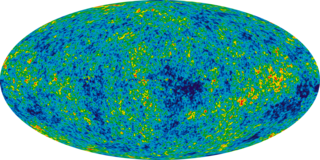
The multiverse is the hypothetical set of all universes. Together, these universes are presumed to comprise everything that exists: the entirety of space, time, matter, energy, information, and the physical laws and constants that describe them. The different universes within the multiverse are called "parallel universes", "flat universes", "other universes", "alternate universes", "multiple universes", "plane universes", "parent and child universes", "many universes", or "many worlds". One common assumption is that the multiverse is a "patchwork quilt of separate universes all bound by the same laws of physics."

Frederick Seitz was an American physicist, a pioneer of solid state physics, and climate change denier. Seitz was the 4th president of Rockefeller University from 1968 to 1978, and the 17th president of the National Academy of Sciences from 1962 to 1969. Seitz was the recipient of the National Medal of Science, NASA's Distinguished Public Service Award, and other honors.

Max Erik Tegmark is a Swedish-American physicist, machine learning researcher and author. He is best known for his book Life 3.0 about what the world might look like as artificial intelligence continues to improve. Tegmark is a professor at the Massachusetts Institute of Technology and the president of the Future of Life Institute.

Frank Anthony Wilczek is an American theoretical physicist, mathematician and Nobel laureate. He is the Herman Feshbach Professor of Physics at the Massachusetts Institute of Technology (MIT), Founding Director of T. D. Lee Institute and Chief Scientist at the Wilczek Quantum Center, Shanghai Jiao Tong University (SJTU), distinguished professor at Arizona State University (ASU) and full professor at Stockholm University.
Julian Barbour is a British physicist with research interests in quantum gravity and the history of science.
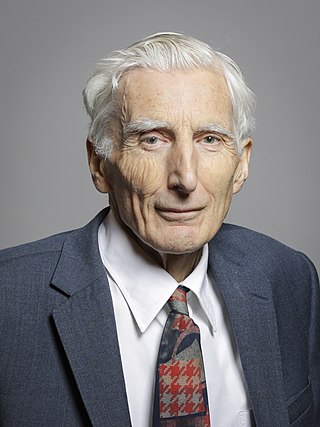
Martin John Rees, Baron Rees of Ludlow, is a British cosmologist and astrophysicist. He is the fifteenth Astronomer Royal, appointed in 1995, and was Master of Trinity College, Cambridge, from 2004 to 2012 and President of the Royal Society between 2005 and 2010. He has received various physics awards including the Wolf Prize in Physics in 2024 for fundamental contributions to high-energy astrophysics, galaxies and structure formation, and cosmology.
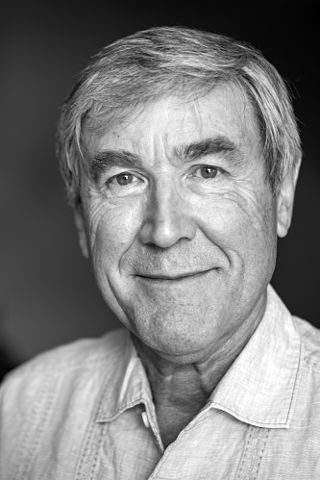
Paul Charles William Davies is an English physicist, writer and broadcaster, a professor in Arizona State University and director of BEYOND: Center for Fundamental Concepts in Science. He is affiliated with the Institute for Quantum Studies in Chapman University in California. He previously held academic appointments in the University of Cambridge, University College London, University of Newcastle upon Tyne, University of Adelaide and Macquarie University. His research interests are in the fields of cosmology, quantum field theory, and astrobiology.

Lawrence Maxwell Krauss is a Canadian-American theoretical physicist and cosmologist who taught at Arizona State University (ASU), Yale University, and Case Western Reserve University. He founded ASU's Origins Project in 2008 to investigate fundamental questions about the universe and served as the project's director.
In physics and cosmology, the mathematical universe hypothesis (MUH), also known as the ultimate ensemble theory, is a speculative "theory of everything" (TOE) proposed by cosmologist Max Tegmark. According to the hypothesis, the universe is a mathematical object in and of itself. Tegmark extends this idea to hypothesize that all mathematical objects exist, which he describes as a form of Platonism or Modal realism.
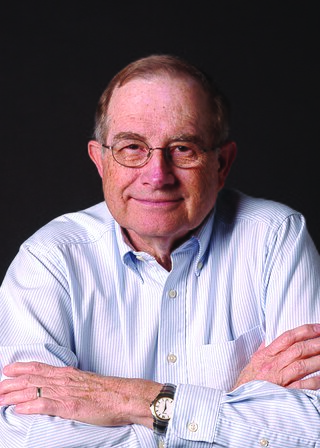
Cornelius Francis "Neal" Lane, is an American physicist and senior fellow in science and technology policy at Rice University's Baker Institute for Public Policy and Malcolm Gillis University Professor Emeritus of Physics and Astronomy Emeritus at Rice University in Houston, Texas.

The David and Lucile Packard Foundation is a private foundation that provides grants to not-for-profit organizations. It was created in 1964 by David Packard and his wife Lucile Salter Packard. Following David Packard's death in 1996, the Foundation became the beneficiary of part of his estate.

Brian Paul Schmidt is an American Australian astrophysicist at the Australian National University's Mount Stromlo Observatory and Research School of Astronomy and Astrophysics. He was the Vice-Chancellor of the Australian National University (ANU) from January 2016 to January 2024. He is known for his research in using supernovae as cosmological probes. He previously held a Federation Fellowship and a Laureate Fellowship from the Australian Research Council, and was elected a Fellow of the Royal Society (FRS) in 2012. Schmidt shared both the 2006 Shaw Prize in Astronomy and the 2011 Nobel Prize in Physics with Saul Perlmutter and Adam Riess for providing evidence that the expansion of the universe is accelerating.

Sean Michael Carroll is an American theoretical physicist and philosopher who specializes in quantum mechanics, cosmology, and the philosophy of science. He is the Homewood Professor of Natural Philosophy at Johns Hopkins University. He was formerly a research professor at the Walter Burke Institute for Theoretical Physics at the California Institute of Technology (Caltech) department of physics. He also is currently an external professor at the Santa Fe Institute, and he has been a contributor to the physics blog Cosmic Variance, where he has published in scientific journals such as Nature as well as other publications, including The New York Times, Sky & Telescope, and New Scientist. He is known for his atheism, his vocal critique of theism and defence of naturalism. He is considered a prolific public speaker and science popularizer. In 2007, Carroll was named NSF Distinguished Lecturer by the National Science Foundation.
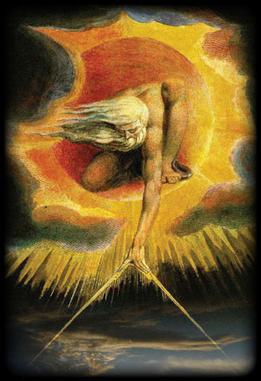
Beyond Belief: Science, Religion, Reason and Survival was the first gathering of The Science Network's annual Beyond Belief symposia, held from November 5–7, 2006, at the Salk Institute for Biological Studies in La Jolla, California.

Antony Garrett Lisi, known as Garrett Lisi, is an American theoretical physicist. Lisi works as an independent researcher without an academic position.
Sara Imari Walker is an American theoretical physicist and astrobiologist with research interests in the origins of life, astrobiology, physics of life, emergence, complex and dynamical systems, and artificial life. Walker is deputy director of the Beyond Center for Fundamental Concepts in Science at Arizona State University (ASU), associate director of the ASU-SFI Center for Biosocial Complex Systems and an associate professor at ASU. She is a co-founder of the astrobiology social network SAGANet, and on the board of directors for Blue Marble Space, a nonprofit education and science organization. As a science communicator, she is a frequent guest on podcasts and series, such as Through the Wormhole with Morgan Freeman.

Chanda Prescod-Weinstein is an American theoretical cosmologist and particle physicist at the University of New Hampshire. She is also an advocate of increasing diversity in science.
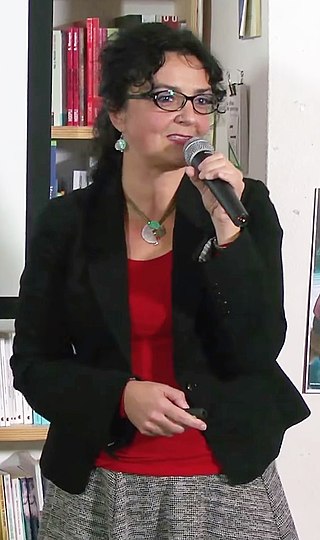
Cătălina Oana Curceanu is a Romanian physicist and lead researcher at the Istituto Nazionale di Fisica Nucleare. She researches low energy quantum chromodynamics.
The John Templeton Foundation is a philanthropic organization that reflects the ideas of its founder, John Templeton. Templeton became wealthy as a contrarian investor, and wanted to support progress in religious and spiritual knowledge, especially at the intersection of religion and science. He also sought to fund research on methods to promote and develop moral character, intelligence, and creativity in people, and to promote free markets. In 2008, the foundation was awarded the National Humanities Medal. In 2016, Inside Philanthropy called it "the oddest—or most interesting—big foundation around."
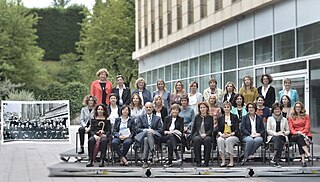
Francesca Vidotto is an Italian theoretical physicist.
References
- ↑ About the Foundational Questions Institute
- ↑ Schwarzchild, Bertram (December 2005). "News notes: Foundational Questions Institute". Physics Today. 58 (12): 31. Bibcode:2005PhT....58T..31F. doi:10.1063/1.2169440.
- ↑ "Our Team". FQxI. Retrieved 2024-09-27.
- ↑ https://fqxi.org/programs/zenith-grants/
- ↑ https://fqxi.org/programs/zenith-grants/
- ↑ "Essay Contest page". fqxi.org. Retrieved 13 February 2023.
- ↑ https://fqxi.org/about-us/our-team/
- ↑ https://qspace.fqxi.org/news/137595/fqxis-new-large-grant-rfp?hero_title_option=0
- ↑ https://fqxi.org/programs/competitions/
- ↑ https://qspace.fqxi.org/news/149928/information-as-fuel-a-new-fqxi-research-program?hero_title_option=0
- ↑ "Initiative will join physics, theology". Boston Globe . 31 July 2006. Retrieved 12 February 2018.
- ↑ Epstein, David (1 August 2006). "Separation of Church and Science". Inside Higher Ed . Archived from the original on 12 February 2018. Retrieved 12 February 2018.
- ↑ "Foundational Questioners Announced". Sean Carroll (blog). 31 July 2006. Retrieved 12 February 2018.
- ↑ https://fqxi.org/about-us/membership/
- ↑ "Membership". FQxI. Retrieved 2024-10-03.
- ↑ https://fqxi.org/about-us/our-team/